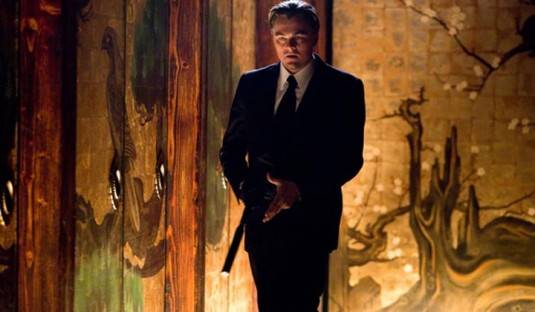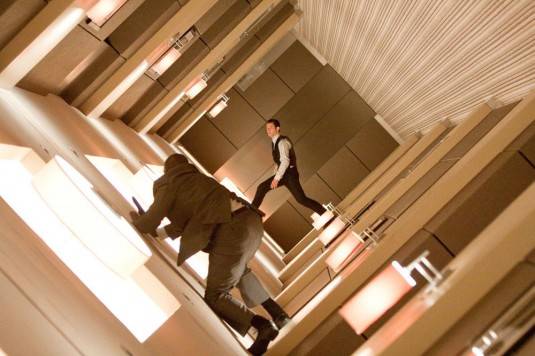
It must be any director’s dream (pun unapologetically intended) to work with dreams as subject matter. Their unique and subjective nature allows for a near limitless canvas of ideas and designs to be explored in fascinating ways. The only limits of course being the imagination… and nowadays the CGI budget. Furthermore, any typical film convention can be shed, as the rules that apply to normal behavior or flow of logic do not necessarily follow in the dreamscape. There are some rules (e.g. you cannot die in a dream, etc.), but for the most part, it’s open water. After all, the film industry is often referred to as a “dream factory,” so then is a film about dreams a natural pinnacle of artistic expression in cinema? Possibly. Does Inception reach that caliber as a film? Not quite.
Strawmen aside, Inception comes loaded with expectations that are hard to shake. Most of all that it was written and directed by Christopher Nolan, the esteemed and without a doubt capable auteur that revived the Batman series with Batman Begins and, specifically, The Dark Knight, the magnum opus of the superhero era. Inception is close in spirit to these films, but it also calls to memory Memento, one of Nolan’s now-underrated works about a man who struggles with short-term memory loss. Both use the human mind as the backdrop for an intricate and suspenseful narrative. If there is one thing for which to applaud Nolan, it is his ability to balance these elements with human substance—a skill largely missing in the realm of modern action films. So, despite the lofty expectations that come with Nolan’s name being attached to a project, he is still able to work effectively in his established corner of the playground. Simply put, this is not merely filler material between Batman flicks (I don’t think I need to say that you can expect his TDK follow-up exactly two years from today).
As for the material, it is basically a caper involving a team that specializes in what is called “extraction,”—that is, stealing secrets from a dreaming individual’s subconscious. For what purpose? It is largely done in the name of corporate espionage. Companies want confidential information from their competitors, so they hire extractors. The team is led by Dom Cobb (Leonardo DiCaprio), who is so incredibly Machiavellian in his ability to extract secrets that it is inevitable that he is hiding secrets of his own and, since most of the film is spent traversing through his dreams, it isn’t long before these secrets reveal themselves. Cobb’s right hand man is Arthur (Joseph Gordon-Levitt); he handles most of the business on the technical side of extraction.
Cobb and Arthur are approached by Saito (Ken Watanabe), a wealthy businessman with a proposition. He wants a man named Robert Fischer (Cillian Murphy) to dissolve his father’s multinational energy empire. To accomplish this requires not extraction, but inception—the act of planting an idea in the subconscious, which, the film explains, is much more difficult than extraction. Arthur says it’s impossible. Cobb disagrees. The trick is that it will not work if the dreamer suspects that it is a foreign idea. I guess that makes sense. Paul McCartney famously wrote “Yesterday” in a dream, but maybe if dream espionage was common, he would have been a little suspect…
For help with the mission, Cobb enlists Ariadne (Ellen Page) as a dream architect. In teaching her the process of constructing a dreamworld, the audience learns most of the rules involved in creating dreamworlds for the purpose of extraction. For example, a kick is the mechanism used in a dream to wake the dreamer (the sensation of falling is popular). Continuity doesn’t matter because, after all, who remembers how a dream begins or ends? Creating a world too similar to reality will cause the dreamer to reject the dream state by directing attention to errors. In effect, the details of the dream architecture are less important than the mood created. Consequently, many of these early sequences are among the most visually engrossing and surreal in the film. Particularly effective is a suspenseful elevator ride through Cobb’s psyche.

As the mission into Fischer’s mind begins, the mood and even some of the visuals take the backburner in favor of hardboiled, multilayered action. Some of the visual awe remains but only in the sense that it goes beyond typical action fare and effectively utilizes CGI. One particular sequence is more befitting of a Bond film than a psychological thriller. Only on an unexpected, climactic detour through one of the characters’ subconscious do things begin to literally and figuratively pull apart at the seams and move in surreal directions, but even then, it is fairly modest.
Indeed, part of the problem is that in creating rules and boundaries to serve the extractions and inceptions, Nolan ultimately handcuffs the potential creativity of the final dream sequences. After such a strong first half, it is slightly disappointing to see this happen, especially when Nolan is bringing his action-sequence A-game. Everything taken together, Inception could be wind up the blockbuster of the summer and maybe even one of ten Best Picture nominees, but if you’re looking for a real mind-bender that also delivers on action, you can probably do better.
Inception is now playing at the Savoy 16 and Beverly Cinema. Watch the trailer here:








